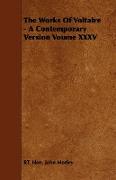The Works of Voltaire - A Contemporary Version Voume XXXV
BücherAngebote / Angebote:
THE BEHAVIOR of the Sorbonne to Peter, when he went to visit the mausoleum of Cardinal Richelieu, deserves to be treated of by itself. Some doctors of this university desired to have the honor of bringing about a union between the Greek and Latin Churches. Those who are acquainted with antiquity need not be told that the Christian religion was first introduced into the West by the Asiatic Greeks that it was born in the East, and that the first fathers, the first councils, the first liturgies, and the first rites, were all from the East that there is not a single title or office in the hierarchy but was in Greek, which plainly shows whence they were all derived. Upon the division of the Roman Empire it was inevitable that sooner or later there must be two religions as well as two empires, and that the same schism should arise between the History of the eastern and western Christians, as between the followers of Osman and the Persians. It is this schism which certain doctors of the Sorbonne thought to crush all at once by means of a memorial which they presented to Peter the Great, and effect what Pope Leo IX. and his successors had in vain labored for many ages to bring about, by legates, councils, and even money. These doctors should have known that Peter the Great, who was the head of the Russian Church, was not likely to acknowledge the popes authority. They ex- patiated in their memorial on the liberties of the Gallican Church, which the czar gave himself no concern about. They asserted that the popes ought to be subject to the councils, and that a papal decree is not an article of faith but theeir representations were in vain all they got by their pains was to make the pope their enemy by such free declarations, at the same time that they pleased neither the czar nor the Russian Church. There were in this plan of union certain political views which the good fathers did not understand, and some points of controversy which they pre- tended to understand, and which each part. explained as they thought proper. It was concerning the Holy Ghost, which, according to the Latin church, proceeds from the Father and thc Son, and which at present, according to the Greeks, proceeds from the Father througl-1 the Son, after having, for a considerable time, proceeded from the Father only on this occasion they quoted a passage in St. Epiphanius, where, it is said, that the Holy Ghost is Russian Empire neither brother to the Son, nor grandson to the Father. But Peter, when he left Paris, had other business to mind than that of clearing up passages in St. Epiplranius. Nevertheless, he received the memorial of the Sorbonne with his accustomed affability. That learned body wrote to some of the Russian bishops, who returned a polite answer, thougl the major part of them were offended at the proposed union...
Folgt in ca. 15 Arbeitstagen
